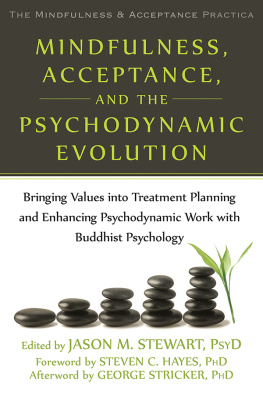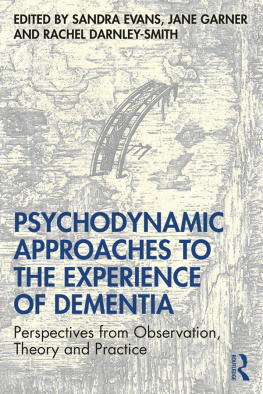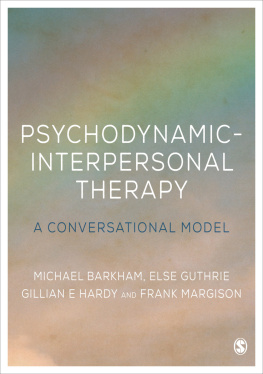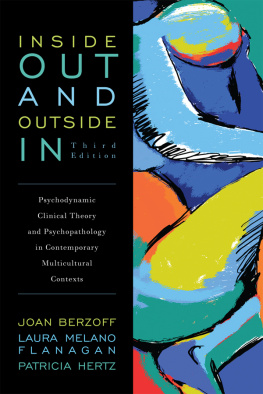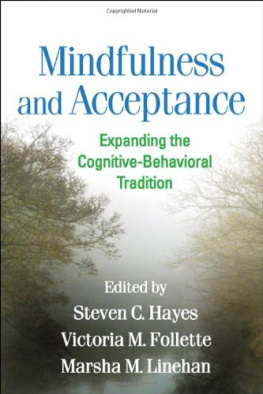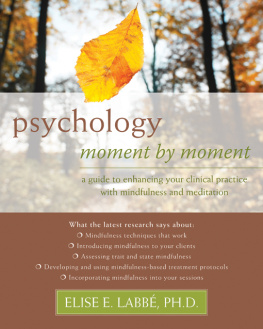Jason M. Stewart - Mindfulness, Acceptance, and the Psychodynamic Evolution: Bringing Values into Treatment Planning and Enhancing Psychodynamic Work with Buddhist Psychology
Here you can read online Jason M. Stewart - Mindfulness, Acceptance, and the Psychodynamic Evolution: Bringing Values into Treatment Planning and Enhancing Psychodynamic Work with Buddhist Psychology full text of the book (entire story) in english for free. Download pdf and epub, get meaning, cover and reviews about this ebook. year: 2014, publisher: New Harbinger Publications, genre: Politics. Description of the work, (preface) as well as reviews are available. Best literature library LitArk.com created for fans of good reading and offers a wide selection of genres:
Romance novel
Science fiction
Adventure
Detective
Science
History
Home and family
Prose
Art
Politics
Computer
Non-fiction
Religion
Business
Children
Humor
Choose a favorite category and find really read worthwhile books. Enjoy immersion in the world of imagination, feel the emotions of the characters or learn something new for yourself, make an fascinating discovery.
- Book:Mindfulness, Acceptance, and the Psychodynamic Evolution: Bringing Values into Treatment Planning and Enhancing Psychodynamic Work with Buddhist Psychology
- Author:
- Publisher:New Harbinger Publications
- Genre:
- Year:2014
- Rating:5 / 5
- Favourites:Add to favourites
- Your mark:
Mindfulness, Acceptance, and the Psychodynamic Evolution: Bringing Values into Treatment Planning and Enhancing Psychodynamic Work with Buddhist Psychology: summary, description and annotation
We offer to read an annotation, description, summary or preface (depends on what the author of the book "Mindfulness, Acceptance, and the Psychodynamic Evolution: Bringing Values into Treatment Planning and Enhancing Psychodynamic Work with Buddhist Psychology" wrote himself). If you haven't found the necessary information about the book — write in the comments, we will try to find it.
If you are a psychodynamic therapist interested in the growing mindfulness movement, you may be looking for resources to help you enhance your practice. More and more, professionals in the psychodynamic tradition are finding that mindfulness exercises help their patients connect with the moment and discover the underlying causes of their fears and anxieties. This groundbreaking book spotlights the similarities between these two therapeutic approaches, and shows how mindfulness in the present moment, acceptance of internal experiences, and commitment to ones values are implicit elements of psychodynamic psychotherapy.
In this much-needed volume, psychologist and editor Jason M. Stewart offers a unique perspective on client treatment that fuses psychodynamic psychotherapy, mindfulness and acceptance-based approaches, and Buddhist psychology. Using the insights in this powerful resource, you will help your clients gain greater psychological flexibility, connect with their values and goals, and create a life that is purposeful, meaningful, and vital.
Recent research supports the effectiveness of both psychodynamic and mindfulness-based processes in contributing to success in psychotherapy. This book does not suggest that mindfulness practice can take the place of psychodynamic therapy. Rather, it offers powerful, evidence-based strategies to help you enhance your practice. If you are ready to take your practice to the next level, this book will be your guide.
The Mindfulness and Acceptance Practica Series
As mindfulness and acceptance-based therapies gain momentum in the field of mental health, it is increasingly important for professionals to understand the full range of their applications. To keep up with the growing demand for authoritative resources on these treatments, The Mindfulness and Acceptance Practica Series was created. These edited books cover a range of evidence-based treatments, such as acceptance and commitment therapy (ACT), cognitive behavioral therapy (CBT), compassion-focused therapy (CFT), dialectical behavioral therapy (DBT), and mindfulness-based stress reduction (MBSR) therapy. Incorporating new research in the field of psychology, these books are powerful tools for mental health clinicians, researchers, advanced students, and anyone interested in the growth of mindfulness and acceptance strategies.
Jason M. Stewart: author's other books
Who wrote Mindfulness, Acceptance, and the Psychodynamic Evolution: Bringing Values into Treatment Planning and Enhancing Psychodynamic Work with Buddhist Psychology? Find out the surname, the name of the author of the book and a list of all author's works by series.

